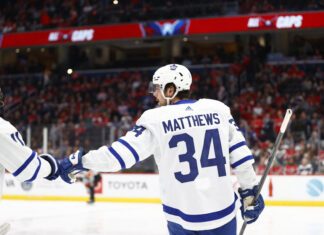Did Bettors Take Advantage of “Tanking” Scenario?
The latest online gambling news in Canada suggests that the C-290 sports betting bill will remained stalled in the Senate for reasons other than the influence of professional sports leagues. It would seem apparent that the league is constructing the narrative that there is indeed a huge difference between what is, in effect, a “parlay” situation for betting on games and that which involves wagers on one game at a time.
If there is any compelling argument the league uses, it is their statement that “Making single-game sports gambling a widespread legitimized institution will portray an image to our fans, including the youth, that gambling and sports are not only an accepted combination, but a natural one, so that if they enjoy sports, they will also enjoy gambling.”
But there is also that assertion on their part that fans will perceive that if there is single-game wagering on their events, it would lead to a perception that the games aren’t completely legit, because of the possibility that certain factors that could impact the outcome of a game could be manipulated, namely player injury reports. Of course, this position is a bit thin. Gambling exists now, in bigger volume than anything that could be produced as a result of the passage of Bill C-290, so if there is a hazard (and there is no indication that there IS one, relative to legalized gambling), how would it be significantly exacerbated? #/p
And let’s talk specifically about the nature of these games. If we humor those in the NHL who apparently believe their personnel are vulnerable to being bribed or coerced, what, short of a conspiracy, could possibly wind up affecting the outcome of a game? Certainly a single superstar player, or a goaltender, could have that kind of influence, but is this any different than the possibilities in any of the major sports? Imaginations can run wild and construct any scenario that is convenient at any given time.
What should be far more alarming for the league, and what should have brought much more of an admonition, is the common practice on the part of some teams to engage in what is, in point of fact, “tanking” in order to improve draft position – in this particular case, the chances of winning the NHL Draft Lottery. When a team “tanks” a game, it doesn’t necessarily “throw” it or take part in a fix. It is more sophisticated than that, and is more a product of organizational philosophies and attitudes, put into action, that has the residual effect of the team losing games. In these cases they were non-contenders to begin with, so they simply began a purge of certain personnel in an attempt to “rebuild” for the future.
Much fanfare has been given to this in the National Basketball Association this season; the public and press has openly talked about the tanking efforts of franchises such as the New York Knicks, Los Angeles Lakers and Philadelphia 76ers, who either made curious trades or sat out injured players longer than necessary , perhaps “shutting them down” altogether. The bottom line is that there is not an effort that is focused on victory, but in improving the salary cap situation or being in a better spot to win when the lottery is conducted.
You can imagine that it is really feverish when a player who is potentially transformative is available in a draft. That is the case in the NHL this season, as Connor McDavid is not only the clear #1 selection, but also a player expected to be among the league’s elite very quickly; conceivably someone who can change a team’s fortunes around immediately.
McDavid, who got “exceptional player status” to enter the Ontario League a year early, is finishing up his third season with the Erie Otters, where he scored 44 goals with 76 assists in his first 47 games. He is in the “can’t miss” category.
Jay Jablonski, president of Image Sports Network, which televises all the Otters’ games, calls McDavid “the next Gretzky” as many others do.
“He’s a great kid and a great hockey player,” says Jablonski.” I’ve produced every regular season home game that he’s played in since he arrived in Erie and every night he amazes me.”
Enough NHL teams were also amazed enough that they took to tanking just to have a better chance at his services. Teams who joined in the non-effort included the Edmonton Oilers, Buffalo Sabres, Carolina Hurricanes, Arizona Coyotes and Toronto Maple Leafs, who fired coach Ron Wilson in mid-season and participated in the kinds of deals that seem designed to improve draft position. Hockey writers in North America enjoyed speculating as to when their own teams would start to tank for McDavid, once they fell out of the playoff race.
And by the way, as an added attraction, the team with the worst record, at the very least, had the opportunity to draft Jack Eichel, another “can’t miss” guy who is a center at Boston University.
Sure, this may have afforded an edge to some sports bettors who could see this trend unfolding before others, and in hockey, wit the presence of money lines and puck lines, that is something that can be taken advantage of. But there is an integrity concern here as well, an the NHL seemed to be in denial about it. When team executives construct their lineups to minimize chances of winning, it is not only inherently dishonest, but also cheats ticket holders as well. They bought seats in advance expecting something better. They didn’t get it. But the NHL is more concerned about gambling, which exists in abundance already, prompting outright game-fixing, for which there is no evidence at all.
By the way, the biggest loser did not necessarily turn out to be the biggest “winner.” The Oilers, with the third-worst record in the league, won the lottery and will get McDavid, so another Gretzky, perhaps, comes to town. But on an overall basis, does the NHL win here? And do they bolster their case against Bil C-290? We think not.


![Craig Berube Post Game, Panthers 5 vs. Leafs 1: “[Offensively] we aren’t hard enough around the net, and we aren’t working hard enough to get to the net” Craig Berube, Toronto Maple Leafs head coach](https://mapleleafshotstove.com/wp-content/uploads/2024/10/berube-pg-nj-218x150.jpg)























![Craig Berube Post Game, Panthers 5 vs. Leafs 1: “[Offensively] we aren’t hard enough around the net, and we aren’t working hard enough to get to the net” Craig Berube, Toronto Maple Leafs head coach](https://mapleleafshotstove.com/wp-content/uploads/2024/10/berube-pg-nj-100x70.jpg)






